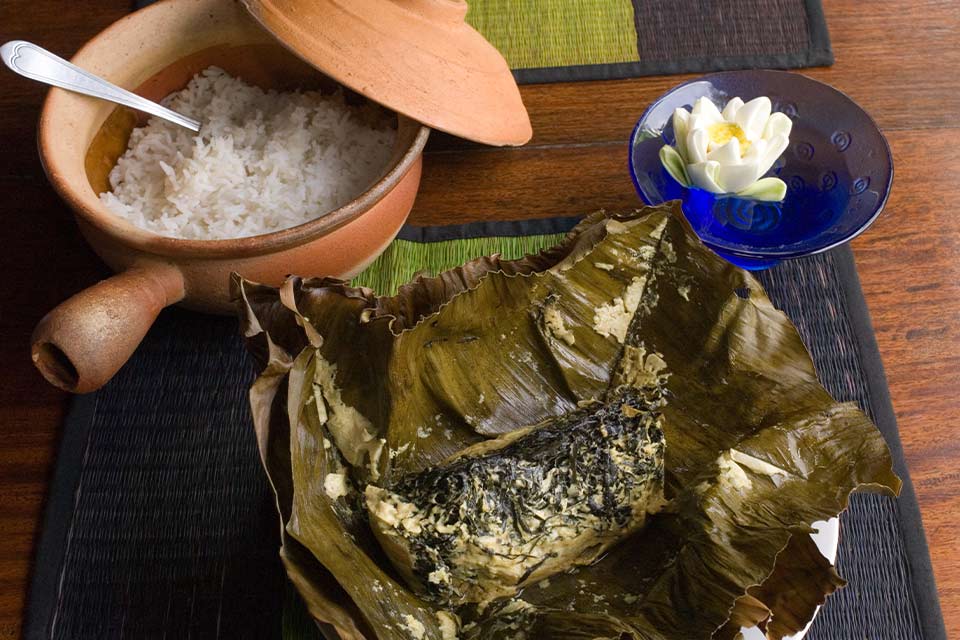Silken Rebellion Fish Fry: How to Make Your Unfresh Fish Rations Taste Rather Delicious

Escaping the Khmer Rouge, Chantha Nguon’s family moved to Saigon, where they lived as refugees. There, restoring flavor to the drab palate of their lives felt like a tiny act of rebellion. Lemongrass-fried fish lives on as a frequent dish, a simple and exquisite homage to Nguon’s mother.
When I was nine years old, in 1970, I fled Cambodia with my older brother and sisters. A military coup had ousted the prince and installed a general who right away began inciting violence against ethnic Vietnamese. Because my mother (in Khmer, I called her Mae) was from a Vietnamese family, she felt her children would be safer in wartime Saigon than in Cambodia, where an even darker ideological unrest was rising.
Mae escaped later, with the Khmer Rouge at her heels. In Saigon, we lived as refugees—during the war, and after South Vietnam fell. Even before the communists marched in, we had very little money and could not eat the sumptuous meals my mother had prepared for us in her Battambang kitchen, back when our world still felt safe.
But this new Saigon, brought to us by the North Vietnamese, was tasteless and colorless, devoid of the flavors I craved. Every month we received whatever combination of potatoes, cassava, rice, bug-infested bread, and substandard noodles the Party deemed fit. We sliced the cassava and dried it, then mixed everything together in one pot and choked down the gray, horrible mash. Eating it made us feel that we had devolved from human beings to pigs, content to devour slop from a trough. And the only fish we were able to buy was very small and very aged.
We spent much of our time craving the ingredients we could not have and reminiscing about the delicious dishes from our old life. We cooked up schemes to make something tasty out of our dismal rations and the few decent items we managed to obtain by extralegal means. For us, restoring flavor to the drab palate of our lives felt like a tiny act of rebellion.

Resistance under an authoritarian regime is a tricky undertaking. I learned the techniques from my mother.
Resistance under an authoritarian regime is a tricky undertaking. I learned the techniques from my mother. Her mastery—even before our exile—of carefully plotted disobedience disguised as dutifulness showed me how the task might be accomplished: the ways she had seemed to defer to her husband and mother-in-law when they were alive, while doing exactly as she pleased. In that time and place—when many men ruled their households like autocrats—wives, daughters, and mothers exercised a soft, silken power. We exerted our influence in the way of flowers: charm and guile could accomplish a great deal, we discovered. We need not smash the stinging bee when we could use him, instead, for our own purposes of pollination.
Following the rules of the new regime was essential to preserving the body intact. But small acts of resistance were essential to preserving the mind. And the quiet culinary uprisings Mae mounted in our Saigon kitchen showed me that we did not have to surrender entirely to a reign of dreary, gray blandness.

One of my favorite make-do dishes from those years was my mother’s lemongrass fried fish. Mae concocted a simple potion of diced garlic, lemongrass, chili, and salt—all ingredients even a poor refugee could obtain—and cast a spell upon the ancient, putrid fish we bought from our neighbor in the market. The salt toughened the soft flesh a bit, and the lemongrass hid the odor of too-old fish.
Chopping the lemongrass was always my job. You have to cut off the root and the ends of the stalk, then remove the tough outer layers to get to the softer inner part. Slice the stalk in half lengthwise; with the flat side down, it’s easier to cut. You’ll want to dice it very fine. Pounding the tender inner stalk some first will release the flavor and flood your kitchen with a powerful aroma of bright citrus.
I still fry that fish almost every week. I love the assault of chili and salt, and though I want to forget much about those years in Saigon, I don’t want to forget how we mastered the art of culinary disguise.
Though I want to forget much about those years in Saigon, I don’t want to forget how we mastered the art of culinary disguise.
If you ever find yourself in a resource-poor environment, I can highly recommend the magical properties of garlic, chili, and lemongrass; they taste almost like prosperity if you let yourself believe. As a bonus, the strong flavors linger in your mouth for hours, making you think you just ate moments ago.
The lemongrass-fried fish lives on in the altar of my mind, a simple and exquisite homage to my most treasured ancestor, Mae, who taught me the art of rebelling as quietly as a whisper of silk.
Silken Rebellion Fish Fry
(or How to Make Unfresh Fish Taste Rather Delicious)
This is an excellent training dish for a teenage refugee girl who is learning to cook. It is also useful for turning spoiled girls into useful household members, and for transforming spoiled fish into a palatable meal. Finally, it’s a powerful weapon in the arsenal of any resourceful cook faced with a poverty of resources because of its cheap ingredients and big flavors. (Note: This treatment also works well to enliven plain tofu.)
Serves 4
Ingredients:
2 pounds old fish
too much salt
6 to 8 stalks lemongrass (white part only), minced
8 to 10 cloves garlic, minced
at least 4 Thai red chilies, minced
1 cup neutral oil
Buy the least rotten fish you can find in the communal store or from your neighbor in the market. Grind down a knife edge as sharp as you can get it—the better to chop the tough lemongrass stalks into fine granules. In a bowl, let fish sit for 1 to 2 hours in too much salt, chopped lemongrass, garlic, and a vast quantity of chili. Overdoing it on the salt and chili will make your eyes water and imbue the old fish with a taste of forgetfulness—the idea is for you to forget that this is a very bad fish, indeed. You want to taste salt and chili, not bad fish. In a medium skillet, heat oil over high heat. Turn the heat down and fry the fish slowly, until golden and crisp. Eat it with jasmine rice. If a bad-fish memory reasserts itself, season with more salt and chili as needed.
Editorial note: Adapted from Slow Noodles: A Cambodian Memoir of Love, Loss, and Family Recipes (Algonquin Books, 2024). Copyright © 2024 by the author.







